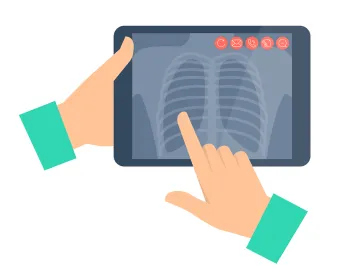The Department of Health and Human Services Office of Inspector General (OIG) recently released a Data Brief summarizing the findings of a review of program integrity risks related to telehealth services reimbursed by Medicare during the first year of the COVID-19 pandemic (the Pandemic).[1] The OIG analyzed Medicare and Medicare Advantage claims data from March 1, 2020, to February 28, 2021, focusing on providers that billed for telehealth services, with an emphasis on identifying providers that posed a high risk to the Medicare program.
The OIG reviewed claims submitted by providers to identify potential concerns of fraud, waste, or abuse by establishing seven criteria that might indicate concerns of fraud, waste, or abuse.[1] Providers that met one of the seven criteria were determined by OIG to be “providers whose billing for telehealth services during the first year of the pandemic pose[d] a high risk to Medicare,” and “[a]ll of these providers warrant further scrutiny.”[2] The seven criteria are as follows:
-
billing both a telehealth service and a facility fee for most visits;
-
billing telehealth services at the highest, most expensive level every time;
-
billing telehealth services for a high number of days in a year;
-
billing both Medicare fee-for-service and a Medicare Advantage plan for the same service for a significant proportion of services;
-
billing a high average number of hours of telehealth services per visit;
-
billing telehealth services for a high number of beneficiaries; and
-
billing for a telehealth service and ordering medical equipment for a significant proportion of beneficiaries.[3]
The OIG found that of the approximately 742,000 providers that submitted telehealth claims to Medicare during the Pandemic, 1,714 providers met at least one of the criteria.. These high-risk providers accounted for $127.7 million in services to some half a million patients. The OIG acknowledged that these high-risk providers represent a small portion of the overall number of providers using telehealth, as well as recognizing the potential telehealth has for improving care coordination and health outcomes. However, the OIG noted that while telehealth expansion is critical in helping to promote access to care, there also is a potential concern for increased risk of fraud, abuse, and misuse.
As a result of the review, the OIG made recommendations to the Centers for Medicare and Medicaid Services (CMS) to “(1) strengthen monitoring and targeted oversight of telehealth services, (2) provide additional education to providers on appropriate billing for telehealth services, (3) improve the transparency of “incident to” services when clinical staff primarily delivered the telehealth service, (4) identify telehealth companies that bill Medicare, and (5) follow up on the providers identified in this report.”
CMS did review and indicate that it will undertake further review of the OIG’s recommendations, but also noted that they have “provided a variety of educational materials to promote proper billing for telehealth services.”[4] Overall, this review and the OIG’s recommendations to CMS indicate a continuing focus on identifying fraud and abuse related to both telehealth and the Pandemic. In addition to the related enforcement actions and recent takedowns in the telehealth space by the OIG, it will be important to take note of any further actions taken by the OIG and CMS as a result of this review and for providers to remain educated and up to date on proper telehealth claims submission practices.
FOOTNOTES
[1] The OIG in its report specifically noted that “none of the measurers that we analyzed confirm that a particular provider is engaging in fraudulent or abusive practices” and indicated it would conduct further investigation. Id. at 22.
[2] Id. at 2.
[3] Id. at 4.
[4] Id. at 28.
[1] U.S. Department of Health and Human Services, Office of Inspector General, Data Brief: Medicare Telehealth Services During the First Year of the Pandemic: Program Integrity Risks, OEI-20-00720 (Sept. 2022), https://oig.hhs.gov/oei/reports/OEI-02-20-00720.pdf




 />i
/>i

